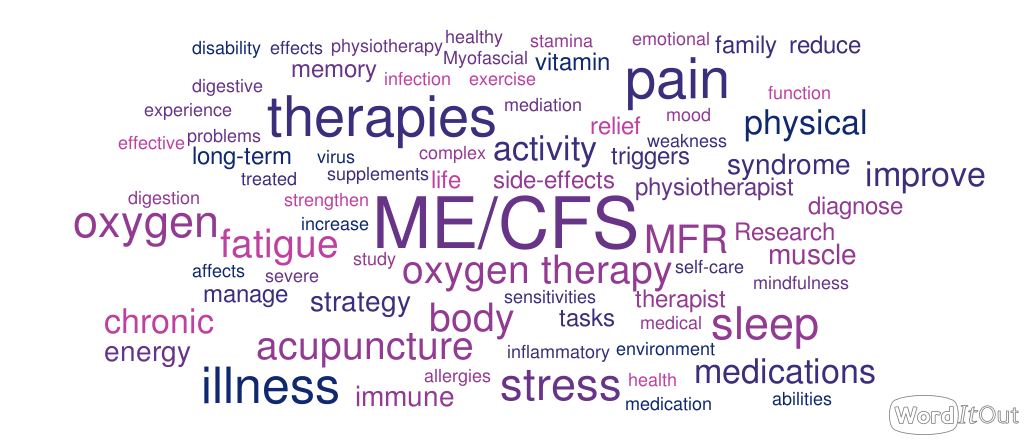
What is ME/CFS? How can we help?
Myalgic encephalomyelitis/chronic fatigue syndrome (ME/CFS) is a complex, disabling long-term illness that affects many body systems. People living with ME/CFS are often not able to do their usual activities and at times, ME/CFS may confine them to bed with overwhelming fatigue that is not improved by rest. ME/CFS may get worse after any activity, whether it’s physical or mental.
Some people may experience tender lymph nodes in the neck or armpits, a recurring sore throat, digestive issues, chills and night sweats, allergies and sensitivities to foods, odours, chemicals, light, or noise, muscle weakness, shortness of breath, irregular heartbeat.
While most common in people between 40 and 60 years old. the illness can affect children, adolescents and adults of all ages. Women are affected more often than men. Caucasians are most commonly affected but many people with ME/CFS have not been diagnosed, especially among minorities. Even though there is no cure for ME/CFS, some symptoms can be treated and managed.
- Chronic/severe fatigue not improved by rest or sleep.
- Sleep problems.
- Problems with thinking and memory.
- Worsening of symptoms while standing or sitting upright.
- Muscle pain and aches.
- Joint pain without redness.
- New or worsening headaches.
- People are not able to function the same way they did before.
- It changes the ability to do daily tasks, like showering or cooking.
- It often makes it hard to work, study or take part in family and social life.
- ME/CFS can last for years and can lead to serious disability.
Researchers have not yet found what causes ME/CFS, and there are no specific tests to diagnose it directly. Doctors consider a diagnosis based on in-depth evaluation of symptoms and medical history.
It possibly has more than one cause, with illness resulting from different causes or two or more triggers working together. Members of the same family sometimes have ME/CFS, however, scientists have not yet found the genes or environmental factors that may be responsible.
- Infections - People with ME/CFS often have their illness begin in a way that reminds them of getting the flu. This has made researchers suspect an infection or virus such as glandular fever, may trigger ME/CFS.
- Immune System changes - It is possibly caused by a change in the immune system and its response to infection or stress. ME/CFS shares some features of autoimmune diseases in which the immune system attacks healthy tissues. However, other signs of autoimmune disease, like tissue damage, are not found.
- Stress - Stress affects the body’s chemistry through the hypothalamic-pituitary-adrenal axis (HPA axis). The HPA axis is a complex network that controls our body’s reaction to stress and regulates a lot of body processes such as the immune response, digestion, energy usage, and mood.
- Changes in energy production - Scientists have found differences between people with ME/CFS and healthy people in the way cells in their bodies get their energy. However, more studies are needed to figure out how these findings may be contributing to the illness.
Treatments
In general, treatments for ME/CFS include both medication and self-care strategies. The emphasis is on minimizing symptoms and improving general health. No one treatment works for all symptoms but trying a variety of treatment strategies can have a cumulative effect.
Some prescription sleep medications help you get to sleep, such as: Eszopiclone (Lunesta); Ramelteon (Rozerem); Zolpidem (Ambien). Others that your doctor may prescribe help you stay asleep. For example: Trazodone (Desyrel); Antidepressants; Benzodiazepines; Muscle relaxants.
A few studies suggest that low B12 levels may be involved in ME/CFS. Research on B12 supplements for these illness has begun, A 2015 study of B12 injections showed a positive response, especially in those who were also taking daily folic acid supplements.
Therapies
A variety of different therapies can help reduce the effect that ME/CFS has on your body and your life.
An occupational therapist can help you make adjustments to your work area or the way you perform certain tasks that will cause less stress on your body.
Complementary Therapies
Acupuncture appears to modestly reduce many types of chronic pain, so it's not surprising that many people with ME/CFS are interested in trying it.
While the studies on the effectiveness of acupuncture for ME/CFS symptoms are somewhat mixed, most suggest that it may have a beneficial role.
This is a hands-on treatment performed on the skin with no oils or creams. By following the unique lines of tension in each patient’s body, the MFR therapist can reach deeply into the tissues and uncover significant restrictions.
MFR involves applying gentle, sustained pressure into these connective tissue restrictions to eliminate pain and restore motion. By going slowly and waiting for the body’s natural rhythm, the fascia responds by elongating, rehydrating, and reorganizing.
If you're having trouble finding relief for your pain, it may be worth trying MFR. But if your symptoms don't begin to improve within a few weeks, MFR may not be the right treatment for you.
This is an effective, and safe means of treating and managing the symptoms of ME/CFS, particularly fatigue. Oxygen Therapy is an intermittent inhalation of 98% oxygen in a barochamber chamber at a pressure higher than normal.
Oxygen Therapy causes a dramatic increase in the amount of dissolved oxygen carried by the blood which enables oxygenation of areas with compromised circulation. It also activates oxidant-antioxidant system, stimulates angio- and neurogenesis, modulates inflammatory response, induces brain neuroplasticity, and possesses analgesic effect.
Oxygen therapy involves a 20 -session initial protocol, consecutive sessions, then weekly sessions to help manage symptoms.
